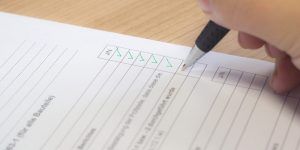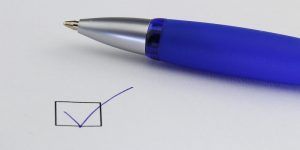

As helping professionals, we routinely gather information about our clients’ functioning.
There are various ways to gather such information, from brief check-ins to more extended or formal evaluations.
Most formal examinations involve questioning clients in depth about their functioning and noting systematically how they behave.
One of the most common types of formal evaluation in psychiatry, psychology, and related fields is the mental status examination (MSE).
The MSE can provide future report readers with a valuable window into how a client presented at a given time, including both negative signs and positive factors.
In this article, we describe in detail standard components of the MSE and provide tips on how best to conduct it. We also offer several templates, a checklist, and questions that can be added when completing an MSE.
Before you continue, we thought you might like to download our three Positive Psychology Exercises for free. These science-based exercises explore fundamental aspects of positive psychology, including strengths, values, and self-compassion, and will give you the tools to enhance the wellbeing of your clients, students, or employees.
The MSE is a method used to document an individual’s basic cognitive, emotional, and behavioral functioning at a given point in time (Martin, 1990).
This method has traditionally been used in psychiatry and clinical psychology but has also been adapted for other helping professions like social work and coaching.
The method usually includes a structured interview and systematic behavioral observations.
There is significant variability among the forms used by different practitioners to gather this information from a client.
At the same time, there are core domains that should arguably be covered whenever an MSE is done.

Common domains covered in the MSE include:
Note: these are not value judgments, but rather descriptors that reflect a client’s functioning or insight. If their clothes are dirty and they are poorly groomed or unshaven, this tells the examiner something about their typical level of self-care and areas in which they might need help.
Speech is obviously a critical domain, as it carries much verbal and nonverbal information, including about emotional state and coherence of thought.
Note: Cognitive assessment within an MSE, covering basic attention and memory capacities, is typically done by psychologists, neuropsychologists, or psychiatrists with specialized training in this area.
Nonetheless, there is room for developing questions and behavioral observations to explore and document the client’s strengths in the MSE.

Enhance wellbeing with these free, science-based exercises that draw on the latest insights from positive psychology.
Download PDF
By filling out your name and email address below.
A structured MSE with a user-friendly examiner form helps ensure that all crucial dimensions of a client’s presentation are explored, without neglecting any.
For example, mood is a critical domain to assess when examining a client. It is included as a domain to be queried in almost all MSE measures.
On the other hand, there are numerous forms of the MSE and no universally accepted format, which can cause some confusion among practitioners.
Below, we offer three MSE sample templates. We also include sample write-ups for the MSE and a comprehensive MSE checklist.

As promised, below you will find useful mental status examination templates, samples and a checklist.
Here are three mental status examination templates. These templates include a brief MSE format and two more-comprehensive and detailed formats.
The first of these samples uses brief comments that efficiently convey all needed information. The second sample is in a longer prose style. Either style can be used to convey crucial information about a client’s cognitive, emotional, and behavioral status.
Behavioral observations & mental status:
Alertness: Alert
Orientation: Fully oriented
Appearance: Congruent with age, well groomed, and appropriate dress
Demeanor: Easy to engage, polite, cooperative, and good eye contact
Attention: Adequate to engage in conversation, although mild distractibility was noted on testing
Language: Fluent and without word-finding difficulty
Memory: Intact autobiographical memory
Motor: No motor abnormalities were observed
Empathy: Intact
Mood: Normal
Affect: Full and reactive
Thought process: Linear, logical and goal oriented
Thought content: Appropriate, with no psychosis, hallucinations, or suicidal or homicidal ideation
Impulsivity: Mild
Judgment: Good
Insight: Good
*Sample provided by Sarah Bullard, PhD, ABPP, used with permission
This 65-year-old woman came alone to testing, having driven herself. She appeared her stated age. She was mildly disheveled in dress and indifferently groomed. Her gait appeared mildly unsteady, and she walked with a cane (“I fell down in my house recently, so now I walk with a cane.”).
She was oriented to place and situation but less well to time (missing the day of week by one, and at first unsure of year). There was a mild tremor in both hands, which increased when reaching for objects with the right hand.
Vision appeared adequate for reading forms, but hearing seemed mildly impaired, with client needing some information repeated. Speech was halting in fluency, with evident word-finding difficulty; mildly loud; with flat intonation.
Affect was generally flat but with some lability (periodic crying spells when discussing current loneliness). She described her mood as “down” most days. She said when she felt down, it was usually because “I’m always alone now, since my husband died three years ago.”
She denied any thoughts or tendency toward self-harm. She reported some memory difficulties, especially for new information. When questioned about alcohol intake (a concern included in physician referral), she said she drank “a few – three or four – glasses of wine” every night but did not consider this a problem.
Insight appeared limited in this latter respect. Social judgment appeared basically intact, based on questioning about a hypothetical scenario (“What would you do if you found a wallet on the floor in a supermarket?” “Bring it to customer service.”).
There was no evidence of formal thought disorder or abnormal thought content. Motivation/effort on testing was variable (gave up easily as test items became even moderately difficult).
Some examiners prefer the convenience of a checklist when conducting an MSE, which they can later expand upon in drafting a formal report.
A comprehensive checklist can be found here: Mental Status Examination Rapid Record Form.
This checklist is highly detailed and includes a very useful glossary of mental status-related terms.

The Positive Psychology Toolkit© is a groundbreaking practitioner resource containing over 500 science-based exercises, activities, interventions, questionnaires, and assessments created by experts using the latest positive psychology research.
Updated monthly. 100% Science-based.
“The best positive psychology resource out there!”
— Emiliya Zhivotovskaya, Flourishing Center CEO
The following worksheet lists common terminology and descriptors that can help make MSE write-ups intelligible to subsequent readers of reports. Shared terminology would prudently include the following, with associated descriptors (generally on a continuum from normal to abnormal):
| Term | Definition | Common descriptors |
|---|---|---|
| Level of consciousness | How alert, aware, responsive is the client? | Alert. |